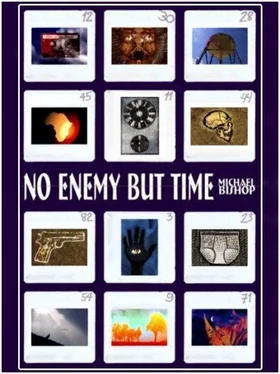“Curse,” Joshua said.
“All right, curse. I’m afraid I agree with you. But it permits time travel of a vivid secondary sort, and it’s not to be spurned as either worthless or trivial.”
“A dream fossil is a worthless fossil, Kaprow.”
“Dr. Blair, you should count yourself lucky that one of the people afflicted with this curse—I know of only three others, although worldwide there may be a few hundred—happens to be a young man with an attunement to the time and place of your own researches. Had his spirit-traveling taken him to the Trojan War, say, I’d probably be talking to a high-ranking classicist from Asia Minor. And you could have kissed this entire project goodbye.”
“Name another,” Joshua said.
“Another what?”
“Another person afflicted with the curse.”
“Well, I’m one, I’m afraid.” Kaprow pulled a folding chair away from the desk and sat down in it with his face in profile to the other men. “The first I ever knew to exist. That’s why I’ve made a career of trying to harness the energy of my dreams.” He chuckled glumly. “Even convinced the Pentagon there was a valuable military application for my work. Believed it myself.”
“Oh? And what was that?”
“Well, Dr. Blair, the introduction of agents—call them saboteurs, if you want—into the time flow downriver from the present. To warn of the attack on Pearl Harbor, say, or to prevent the assassination of Archduke Franz Ferdinand in 1914. Or, somewhat closer to home, to dispatch murderers like Idi Amin and Pol Pot even before they come to power.”
“That’s rather grandiose, isn’t it? Not to mention irresponsible. Those ‘cures’ would invariably trigger events impossible to anticipate. The results might prove worse than the original diseases.”
“You’re correct in theory, of course.”
“And in fact?”
“Time travel of that effective sort is out of the question. We can go back to a past exactly like our real past, but because it’s a projection, or a resonance, of an inaccessible reality, we’re powerless to bring about changes in our consensus present. It’s a vantage without teeth.”
“I’ll be damned if I care for it, Kaprow. We’ll be sending young Joshua here into a landscape of phantoms.”
“They’ll have teeth, though. He’ll perceive them to be every bit as real as himself.”
The paleontologist shook his massive head, shifted his feet among the cables on the concrete floor.
“In one sense, Dr. Blair, what we must accept is better than the alternative you seem to desire. It would be folly to send a contemporary human being to a crucial juncture in the evolution of our species—the old story of the time traveler shooting one of his ancestors. Joshua could conceivably disrupt the course of evolution, bequeathing to our conjectural present a world in which humanity never quite arose from its hominid forebears.”
“I’ll be careful. Word of honor.”
“But by sending him to a perfect simulacrum of the Pleistocene,” the physicist continued, “we sidestep the Grandfather Paradox without sacrificing the concept of time travel. In my opinion, Dr. Blair, what White Sphinx has accomplished is a small miracle. Not only do we have our cake, we eat it too. We can visit our ancestors with impunity.”
Joshua said, “The only danger is to the time traveler himself. He might be eaten by ghosts.”
“True enough,” Kaprow admitted.
* * *
Kaprow never talked about his own attunement. He never talked about previous experiments with the apparatus designed to translate a dreamfarer bodily into the past. He never bragged that already there had been several successful trial runs of his equipment—not at Eglin, because Kaprow had never located a dreamfarer afflicted with a Gulf Coast attunement, but in both Western Europe and the Black Hills of South Dakota. He never mentioned that the Oglala Lakota tribesman who had gone dreamfaring aboard his equipment the previous winter had returned unharmed and promptly refused any further jaunts to the nineteenth century. In fact, Kaprow never talked about either his successes or his failures, and Joshua learned about them—a few of them, at any rate—by discreetly pumping the man’s assistants.
One evening in late September, however, Kaprow invited Joshua home with him for TV dinners and drinks. The physicist had a tiny cottage on the beach, and the first thing Joshua noticed about it when he stepped through the door was that every wall was lined with books. Most of them appeared to be math or science texts, but the glass-fronted cabinet near the kitchen was devoted entirely to tomes about Germany’s Third Reich: memoirs, biographies, historical studies, photographs, psychological monographs, and even a healthy smattering of novels, although until this moment Joshua had supposed Kaprow completely indifferent to fiction. Fiction with a specific historical basis was apparently another matter.
The fried chicken in the frozen TV dinners seemed to have been basted with orange marmalade, and the mashed potatoes were like warm lumps of moist flour, but neither Joshua nor Kaprow was a dedicated gourmet, and they ate without complaining. Afterward, Kaprow broke out a bottle of Napoleon brandy that made up handsomely for the minor indignity of the dinner. They sat in the living room, in the gathering dusk, and drank. The books on the shelves grew darker and darker, and Joshua found himself sinking by twilight degrees into a state of mellow grogginess.
“Am I going to survive this business?”
“The brandy?”
“No, sir. The dreamfaring.”
“Well, soon enough you’ll be undergoing survival training in Zarakal. That ought to help.”
“I’m talking about the psychological aspect, I think. The way it’s going to hit me when I come face to face with the substance of my dreams and I’m no longer exactly dreaming. That’s what I want to know if I’m going to survive. The trauma. What do you think?”
“You’re probably a better judge of that than I am, Joshua. I’m not you, after all. And vice versa.”
For several minutes Joshua watched the light dance across the surface of the brandy in his snifter. “What happened to the Indian who spirit-traveled back to Seventh Cavalry days?”
“Who told you about that?”
“Stallworth. I stayed after him, though. It wasn’t exactly voluntary.”
“Nothing happened to the Indian.”
“He quit, didn’t he?”
“Yes, he quit. Not because of any emotional trauma, however. He didn’t like being surrounded by machinery—technological artifacts, he called the components that helped get him back. He decided the dreamfaring process violated his heritage. And so he went his way, sadder but wiser. I suppose.”
“What about you?”
Kaprow looked across the darkening room at his visitor.
“What about you?” Joshua persisted. “Where do you go, when you go? Which when do you visit?
What’s your attunement?”
Kaprow leaned back in his chair and put his feet on a hassock. A moment later he said, “Hitler’s Germany. Dachau. In clever Aryan disguise, Joshua, I visit the ovens.”
They talked for a long time.
* * *
That December the elf-sized effigies in the display window of the record shop looked to Joshua less like angels than embryonic bats. Each little figure was outfitted with cottony wings, a gown sprinkled with glitter, and a halo that appeared to be a Frisbee spray-painted an ugly gold. Worse, nearly every “angel” was holding in its malformed hands an album jacket featuring a full-color close-up of either a syphilitic or a coke-disfigured recording artist. (The simulation of disease or drug-induced lesions was a minor show-biz trend this holiday season.) The effect was sublimely tacky. On the other hand, in its calculated contempt for every Christmas bromide, the display was perfect, the sort of flamboyant decadence that gave Big Gene Curtiss fits.
Читать дальше



![Ally Carter - [Gallagher Girls 01] I'd Tell You I Love You But Then I'd Have to Kill You](/books/262179/ally-carter-gallagher-girls-01-i-d-tell-you-i-lo-thumb.webp)








